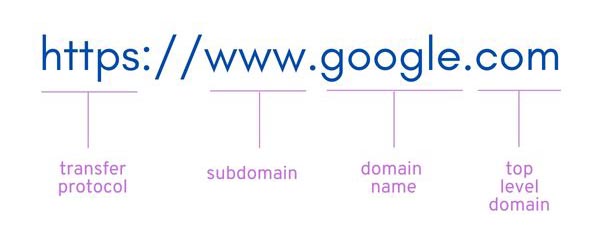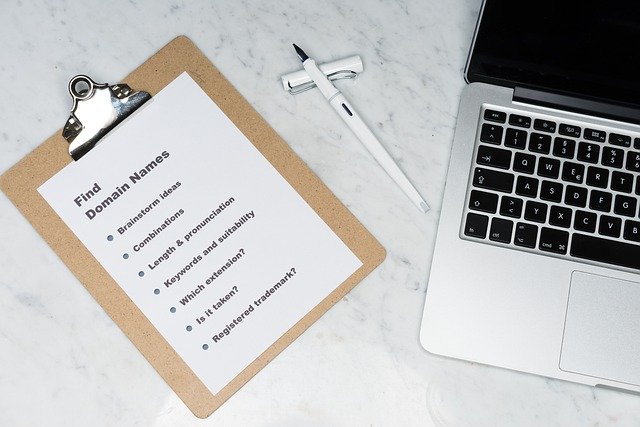If you’re planning on creating a website, you’ll need a domain name, but you're wondering, exactly what is a domain for a website? Here we'll explore everything you need to know about what a domain for a website is, how to go about getting one, what the options are and what common mistakes to avoid.
TABLE OF CONTENTS
WHAT IS A DOMAIN NAME?
A domain name is simply your website's address on the internet. It's the name you'll give to people when you want them to visit your website.
They are essentially the human readable format of a digital address which computers read to be able to fetch and display your website to people who request it.
Examples:
google.com
netflix.com

PARTS OF A DOMAIN ADDRESS
As you see there are two parts of a domain name:
- before the dot - is the name you choose
- after the dot - is the top level domain (TLD), also called the extension or suffix
Together these make up the root domain.
xyz.com
yourdomain.co.uk

There may also be other parts added to it, for example most common is to see - www
www.xyz.com
other common ones you may have noticed are:
help.xyz.com
docs.xyz.com
dashboard.xyz.com
The letters before the domain name are called subdomains. They are essentially like branches coming off the main stem.
If you need a subdomain you can choose to use whatever word you like (almost), although it's probably best to make it as descriptive as possible, to be more easily memorable for your users.
THINGS TO CONSIDER WHEN CHOOSING
A domain name for a website is unique, meaning that if someone else is using the name you want, you will not be able to use the exact same one.
You are able to differentiate names by adding hyphens or having a different TLD. So, for example these would all be different:
bestrestaurant.com
best-restaurant.com
bestrestaurant.co.uk
Businesses and organisations generally tend to use one of two options:
- the company name
- words that describe the products or services that the business provides
If for example your company name is A. R. Thomas Ltd and you sell cars, you might choose something like:
- arthomas.com
- arthomasltd.com
- cheapcars.com
- luxurycars.com
Which you choose can depend on a few things:
- If your company name is well known then you will probably want to use that as your domain name to profit from brand awareness, as people will already be searching for your name
- If you are a local business, that is a business serving a local area as opposed to serving national or international customers, such as a restaurant, a hairdressers, a vets, then you will also most likely want to use your company name as your domain name so that you can benefit from Google's local listings. These are the results which appear when people do geographical or 'near me' searches, such as 'vets near me' or 'vets in London'. Google allows local businesses to register for these listings for free but they may penalise your website or not list it if your domain name is not the same as your company name.
- If none of the above apply to you, if for example you're a personal blogger, or have a special interest site, then you have free reign to choose whatever domain name you fancy.
NOTES ON CHOOSING A DOMAIN NAME
Take some time to give your domain name some thought. Choosing the right one is important because it is the first impression many people will get of your online presence, and it can effect your website's SEO which may impact the number of visitors you get and therefore potentially the number of sales.

Here are some tips to help come up with a great name:
- short names are best because they're most memorable
- if the one you want is not available think of using a creative spelling of it
- avoid words and spelling that are too obscure as you'll end up always having to spell it out for people, which will get tedious and they'll probably forget it anyway
- avoid hyphens, they're annoying and people forget about them
- avoid numbers, you'll have to clarify every time you tell it to people, for example that it's the digits rather then the number spelled in letters
- find a domain with words that people are searching for, such as 'cheap cars' cheapcars.com – this can help with SEO (Search Engine Optimisation), the methods used to make your website more attractive to search engines so that they list it higher in rankings.
- try to keep it unique and brandable
- check the name isn't trademarked
If you're really stuck for ideas you can try to use domain name generators like Domain Name Soup for ideas. There are many such generators online but this one offers a diverse number of ways to search such as by the number of letters, or exact vowel and consonant placements, male or female domains, and much more.
TOP LEVEL DOMAIN
As we saw earlier, the top level domain is the part of the domain name that comes after the dot. The most common is .com, and in the UK .co.uk is also popular especially for local businesses. You've probably also seen .org, .info, .net, .edu.

Although these are the most common, there are actually hundreds of top level domains. You can see a full top level domain list on Wikipedia.
Almost all TLDs used to be country based, but more recently many other TLDs have been released, making for interesting options such as .beauty, .law, .beer, and hundreds more.
Some countries restrict registration of their TLDs to people in their country only. Others allow anyone to buy them regardless of their location. One such example is .me which belongs to Montenegro but is popular in English speaking countries. There are also some TLDs which are privately owned, such as .gucci.
Although most businesses and people want a .com domain name, unless your desired name is quite unique it is likely that it will have been taken already. This is especially true if you want a short word of 3 - 7 letter, as most of these have been taken long ago.
CHECKING AVAILABILITY
Once you've settled on a domain name preference, you'll need to check it's available.
Domain name registrars, where you 'buy' domain names all offer a domain name availability checker, as they can't very well sell you something if you can't check that it's available for sale.
Not all of them offer all the TLDs, so if you want an unusual one, try Namecheap or one of the larger registrars.
Essentially you won't own your domain name but you'll be leasing it and can use it for as long as you pay for it.
REGISTERING A DOMAIN NAME
Most companies and individuals register their domain name for one or two years in advance, although it's possible to do so for up to ten years in advance.
It's very easy to register a domain name. Go to a domain registrar website such as GoDaddy or NetNerd - it doesn't much matter which you choose really, and you simply type in the domain name you would like along with the TLD you would prefer. If it's available you'll be given the option to add it to the basket and then to pay for it like any other online purchase.
The registrar company will try to up-sell you all sorts of things but you don't need them, and if you do later, then you can always upgrade.
AFTER THE PURCHASE
Once the sale has gone through you'll then be sent an email with important details which you should keep safe. Your web designer may need this info, and access to your registrar account to launch your website on and to create domain name emails for you if you want them.
If you don't feel comfortable doing the purchase yourself, your web designer will usually be quite happy to help you with it, but ALWAYS make sure that you are the owner of the domain name - make sure your name is on the account and your bank card is used.. This can't be stressed enough. Unscrupulous people and companies can hold your domain name hostage if relationships sour, and there will really be nothing you can do to get it back if it's not in your name. You'll have to start over with another domain name, potentially losing all the hard work that's gone into building up your website and brand, possibly over many years.
DON’T FORGET TO RENEW!
If you forget to renew your domain name in time, then the domain name becomes openly available for anyone to buy.
Generally if your bank card has not changed, re-registration will happen automatically if it's set to do so in your account with your registrar, and you'll usually get a fair few reminders from your registrar too, but there have been some spectacular renewal forgets. It happened to google.com in 2015 and to hotmail.co.uk in 2003.
With google.com the $12 transaction fee went through Google's own domain name registrar service, but the sale was then cancelled within a minute. The very temporary owner was compensated by Google by $6006.13 – spelling Google as a good will gesture. Microsoft wasn't so lucky and they had to ask to buy the domain back from the new owner.
So now that you know what a domain for a website is, what are you waiting for?
Go get yourself one!
What Is A Domain For A Website?



